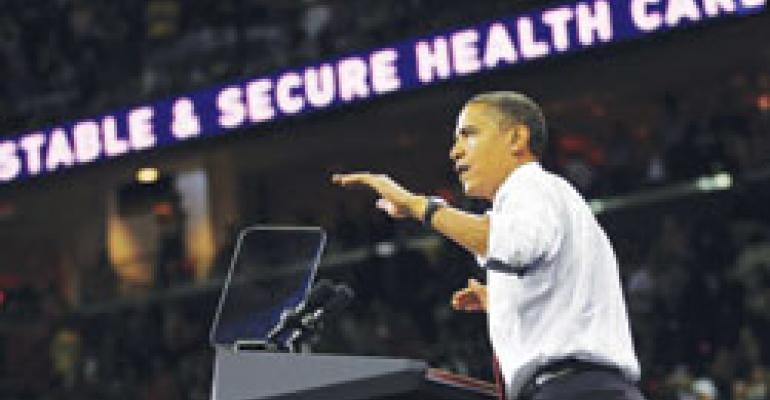While foodservice operators will be eagerly monitoring the economic news over the next 18 months, many also will be following congressional developments as they come out of Washington, D.C.
With the legislative center of gravity shifting from the states to Capitol Hill once again, federal lawmakers are expected to take up a number of issues that could impact the health of the restaurant industry.
Even though 2010 will be an election year—a time when little historically gets accomplished in Washington—observers nevertheless maintain that there will be plenty of action inside the Beltway.
Among the key issues lawmakers are expected to consider are:
Health care reform. Legislative issues don’t come much more complex nor inherently explosive than this one. Health care “sucks all of the [legislative] oxygen out of the room,” observes David French, vice president of government relations for the International Franchise Association. President Obama vowed in the 2008 elections to enact health care reform during his administration, and he appears determined to make good on that promise. He has said he wants to pass a health care program this fall, but observers doubt that it will be completed before the end of the year—if by then. Restaurateurs, for their part, worry that potential costs associated with creating a practicable system could further damage businesses already squeezed by the recession. They also worry that the government will revert to “sin” taxes on carbonated or alcoholic beverages to help pay for coverage, adding once again to their cost of doing business. Card check. The controversially named “Employee Free Choice Act” was temporarily sidelined earlier this year in a victory for the industry, but opponents maintain the card check fight is far from over. According to John Gay, a Washington, D.C.-based consultant and former head of government affairs for the National Restaurant Association, a compromise between labor and Congress could be in the cards. “If compromise means dropping the card-check provision, that’s good,” he says. “But if it includes retaining other measures—like binding arbitration or shorter election times—the industry may end up fighting it as hard as before.” Menu labeling. Many in the industry are hoping federal lawmakers will pass the Labeling Education and Nutrition, or LEAN, Act, thus ending the growing patchwork quilt of state, county and municipal menu-labeling laws. The LEAN Act, which also includes elements of the Menu Education and Labeling Act, would mandate nutrition labeling for chains with 20 or more units. The compromise bill could feasibly find a home as part of the Senate health committee bill. However, a coalition of chain operators has urged lawmakers to broaden the scope of federal menu-labeling legislation to require more restaurant locations to post nutrition data. Food Safety. The House passed the Food Safety Enhancement Act of 2009 by a comfortable margin earlier this year, and the issue is expected to be taken up by the Senate presently. The measure strengthens the Food and Drug Administration in its efforts to prevent and fight foodborne-illness outbreaks. The foodservice industry generally favors the bill, although there is some collateral concern about how the requirements on traceability would affect operators. Scott Vinson, vice president of the National Council of Chain Restaurants, says the polls indicate that voters largely support the measure, so it should be passed by the end of year. Immigration. As if health care were not controversial enough, the president and the Democratic majority in Congress are expected to jump-start comprehensive immigration reform either late this year or next year. While the industry tends to favor some form of action on the issue, it remains as hot as a two-dollar pistol on Capitol Hill. Sen. Chuck Schumer, D-N.Y., is said to be in the process of framing a bill, and while it may not be passed any time soon, observers say to get ready for a lot of heated debate. Climate change/Cap and trade. The Obama administration, in an effort to help reverse climate change, has thrown its support behind the American Clean Energy and Security Act of 2009, a measure that passed by a slim margin in the House earlier this year. The IFA’s French considers the bill a key industry issue that would result in higher energy costs for consumers and businesses alike. While operational expenditures for restaurateurs would be impacted in the form of higher utility and product costs, operators also would feel the pinch of consumers having less money to spend. According to one study French cited, the average American household will lose $2,127 annually in purchasing power if the measure is passed. The study also says electricity costs are estimated to increase 27 percent by 2020 and natural-gas costs will rise by 39 percent for the same time. In a letter to Congress, the IFA urged lawmakers to “oppose policies that are certain to result in sharply higher costs for energy and slower job growth and economic recovery.” Paid sick leave. The New York City Council attracted national attention last month when it was announced that members were considering the passage of a paid-sick-leave mandate. If the council passes the measure, New York would become the third city behind San Francisco and Washington, D.C., to enact such legislation. At the federal level, the Healthy Families Act was introduced earlier this year by Rep. Rosa DeLauro, D-Conn., in the House and by the late Sen. Edward Kennedy, D-Mass., in the Senate. Experts suggest a sick leave provision could easily be attached to a larger health care bill.— [email protected]





